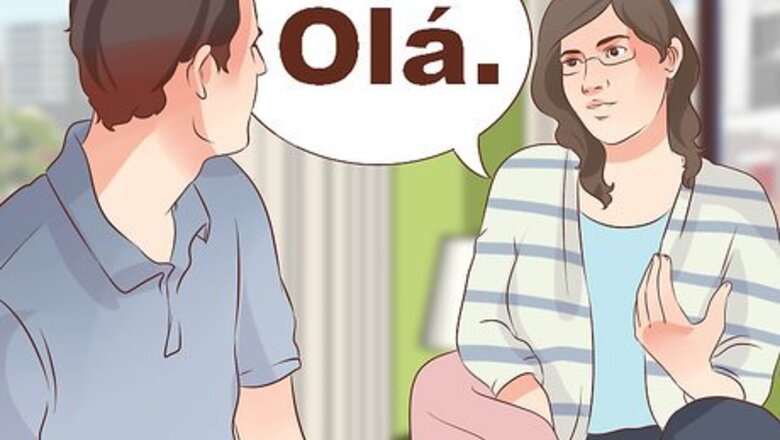
views
Basic Greetings & Questions
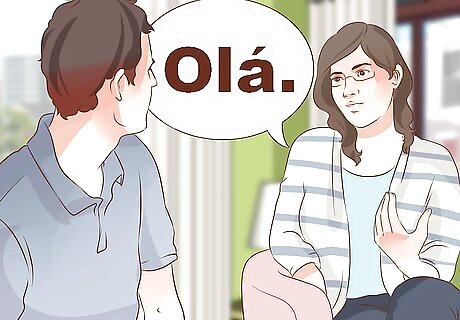
Learn how to greet people properly. It's the absolute first thing you have to do when you walk into any room, so it's important you have something to say! Locals will be very appreciative that you're making an effort from point one. Here are some ways to start: Olá / Oi. = Hi / Hello. Bom dia = Good morning Boa tarde = Good afternoon Boa noite = Good evening or night While we're at it, it's also useful to know time phrases: Manhã = Morning Dia = Day Noite = Evening or night Tarde = Evening before 6 Pela manhã = In the morning De dia = In the day À tarde = In the afternoon De noite = At night

Get down some useful, everyday phrases. Because when you're lost on the side of the road, you may need them. Or, you know, when you're making small talk at the local bar or cafe. Eu não falo português. -- I don't speak Portuguese. (Você) Fala inglês? - Do you speak English? Eu sou de...(Londres). - I am from... (London). Eu sou português. - I'm Portuguese. Desculpe / Com licença. - Excuse me. Muito obrigado/a. - Thank you very much. De nada. - You are welcome/No problem. Desculpe. - Sorry. Até mais. - See you later. Tchau! - Bye!
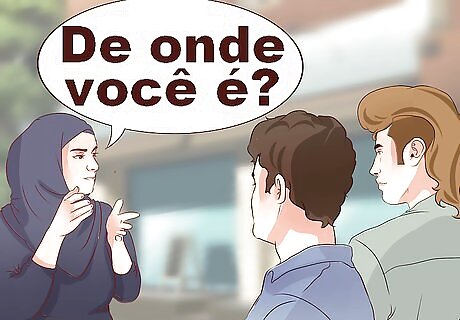
Ask questions. You'll probably want to start a few conversations to hone your skills, so you'll need some phrases in your tool belt to get the ball rolling. De onde você é? - Where are you from? Onde vocês moram? - Where do you live? Quem é ela? - Who is she? O que é isso? - What is this? Onde é o banheiro? - Where is the bathroom, please? O que você faz? - What do you do? Quanto custa isso? or Quanto isso custa? - How much is this?
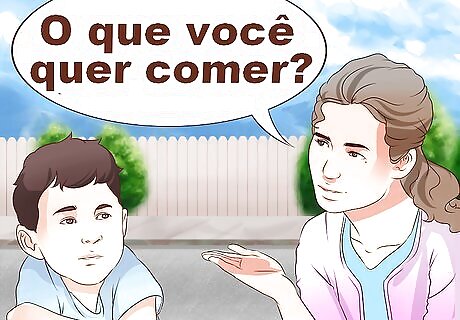
Go out to eat. One of the most common situations you'll find yourself in to practice your skills will be when you're dining out. Here are some phrases you can use to show you know your stuff: O que você quer comer? - What would you like to eat? Você está com fome? - Are you hungry? O que você quer beber? - What would you like to drink? Eu queria um cafezinho. - I'd like an espresso. O que você recomenda? - What do you recommend? Eu quero fazer um pedido - I would like to order now. Uma cerveja, por favor. - A beer, please. A conta, por favor. - The bill (check), please.
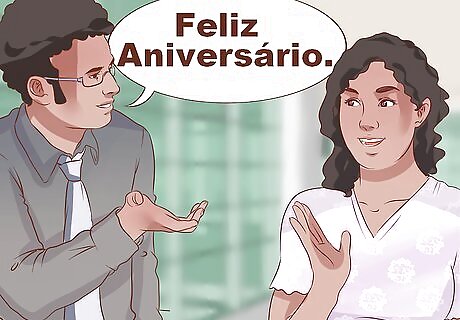
Exchange holiday greetings while visiting. If you're in Brazil for a specific occasion, you may need to exchange holiday greetings. Here's some of the bigguns: Feliz Aniversário = Happy Birthday Feliz Natal = Merry Christmas Feliz Ano Novo = Happy New Year Feliz Dia Dos Namorados = Happy Valentine's Day Feliz Dia das Mães = Happy Mother's Day Feliz Dia dos Pais = Happy Father's Day
Essential Vocabulary
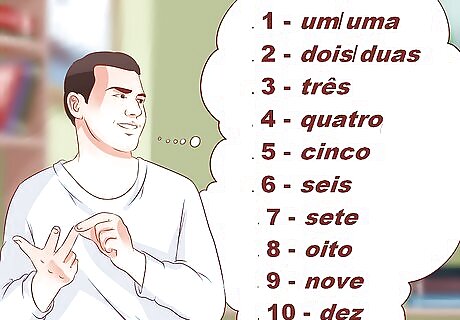
Learn the numbers. Ah, like being a toddler again. In order to have your most basic of understanding—be it at the supermarket, the bar, or on the road, you got to know the numbers. There's a masculine and feminine version for one, two, and the hundreds, by the way. Here are the basics: 1 - um/uma (a masculine noun would use um and a feminine noun, uma) 2 - dois/duas 3 - três 4 - quatro 5 - cinco 6 - seis 7 - sete 8 - oito 9 - nove 10 - dez 20 - vinte 21 - vinte e um 30 - trinta 31 - trinta e um 40 - quarenta 41 - quarenta e um 50 - cinquenta 51 - cinquenta e um See the pattern? It's always the tens place followed by "e" and the ones place.
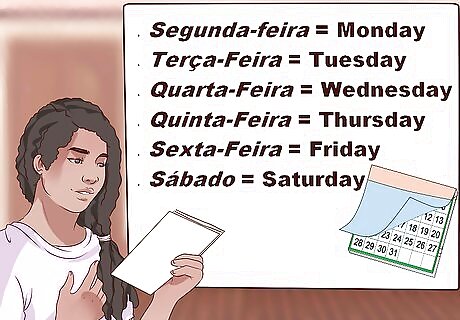
Learn the days of the week. Because regardless of what language you're speaking, it's helpful to know what's going on when.In everyday conversation, it is common to omit the suffix "-feira". So you will find natives using "Segunda", "Terça", and so it goes. Domingo = Sunday Segunda-feira = Monday Terça-Feira = Tuesday Quarta-Feira = Wednesday Quinta-Feira = Thursday Sexta-Feira = Friday Sábado = Saturday
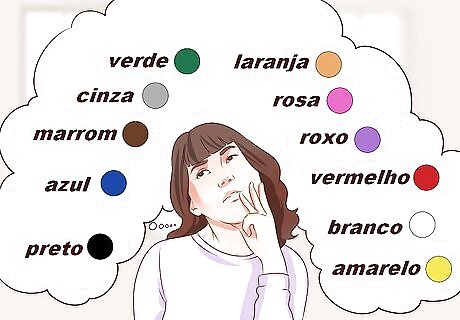
Learn the colors. It'll help for shopping, menus, and just basic communication. Black - preto Blue - azul Brown - marrom Gray - cinza Green - verde Orange - laranja Pink - rosa Purple - roxo Red - vermelho White - branco Yellow - amarelo
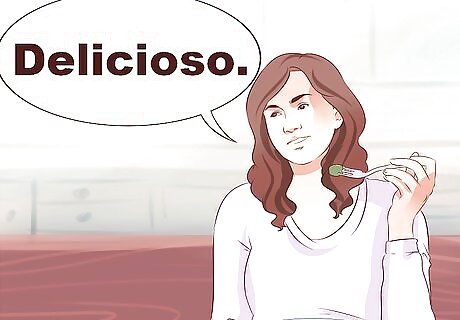
Learn some adjectives. Being able to talk about the things around you will certainly come in handy! You'll be able to give basic opinions on things and understand quite a bit more when you know more than just nouns and verbs. But watch out -- there are masculine and feminine versions (they have to match the noun). Bad - mau/má Good - bom/boa Beautiful - bonito/bonita Big - grande Delicious - delicioso/deliciosa Easy - fácil Sad - triste Small - pequeno/pequena Ugly - feio/feia New - novo/nova Nouns are inherently feminine or masculine in Portuguese and the adjective must match them. Whatever you're talking about, know that it has a gender—if you need to describe it, that gender must match. Generally, feminine versions end in "-a."
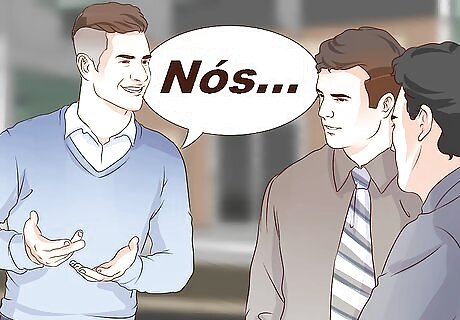
Learn how to talk about people. Portuguese is one of those languages where the verbs have to match the noun or pronoun subject(s)—so knowing the pronouns is pretty important! Here are your options: I - Eu You - Tu or você He/Her/It - Ele/Ela We - Nós or a gente "You guys" - vocês They - Eles/elas
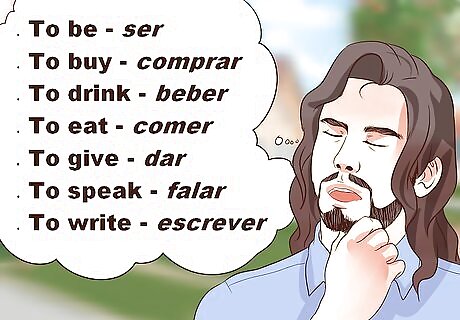
Learn some common verbs. Now that you know how to talk about these people, what are they doing? Here are some common verbs in their infinitive (i.e., to eat) forms: To be - ser To buy - comprar To drink - beber To eat - comer To give - dar To speak - falar To write - escrever To say - dizer To walk - andar to see = ver
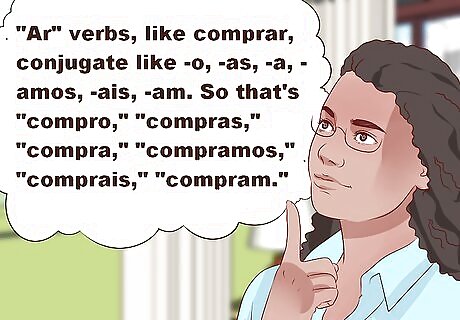
Be able to conjugate those verbs. Unfortunately, being able to say "I to be American" isn't that impressive—you have to make is so your verbs match your subjects. Since some verbs are quite different, let's just cover the regular right now. If you know Spanish, this'll be cake. For those that don't, know that the ending indicates whether the verb goes with I, you, he/she/it, we, you, or they as the subject. "Ar" verbs, like comprar, conjugate like -o, -as, -a, -amos, -ais, -am. So that's "compro," "compras," "compra," "compramos," "comprais," "compram." "Er" verbs, like comer, conjugate like -o, -es, -e, -emos, -eis, -em. So that's "como," "comes," "come," "comemos," "comeis," "comem." "Ir" verbs, like partire, conjugate like -o, -es, -e, -imos, -is, -em. So that's "parto," "partes," "parte," "partimos," "partis," "partem." Of course, these are just three regular examples and that's just in the indicative. There are tons of irregular verbs and loads of tenses, but to cover those would take hours and hours and hours of your time.
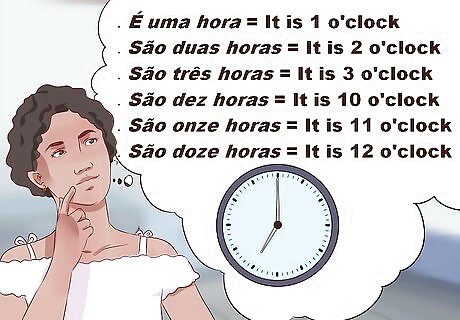
Learn how to tell time in Portuguese. Que horas sao, por favor? Translation: “What time is it, please?” Gotta know how long you have till closing time! É uma hora = It is 1 o'clock São duas horas = It is 2 o'clock São três horas = It is 3 o'clock São dez horas = It is 10 o'clock São onze horas = It is 11 o'clock São doze horas = It is 12 o'clock São oito horas da manhã = It is 8 o'clock in the morning É uma hora da tarde = It is 1 o'clock in the afternoon São oito horas da noite = It is 8 o'clock in the evening É uma hora da manhã = It is 1 o'clock in the morning
Alphabet and Pronunciation
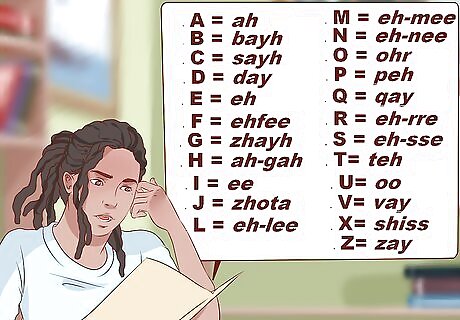
Learn to pronounce the Portuguese alphabet. It's not super different from Spanish, but it's different enough that it'll trip you up in a few places (presuming you know Spanish, that is). Here are the basic sounds (when alone) in the majority of dialects for Brazilian Portuguese: A = ah B = bayh C = sayh D = day E = eh F = ehfee G = zhayh H = ah-gah I = ee J = zhota L = eh-lee M = eh-mee N = eh-nee O = ohr P = peh Q = qay R = eh-rre S = eh-sse T= teh U= oo V= vay X= shiss Z= zay The letters K, W and Y are used only for scientific symbols and foreign words.

Get familiar with the diacritics. Those are the accent marks, or symbols, placed directly above a letter. There's a few to choose from and they crop up in various circumstances. The tilde (~) indicates nasalization. Any letter with this symbol will be said through your nose. Ç/ç is pronounced like "s." That's a cedilla underneath that "c," by the way. Ê/ê is used for stressing and is just pronounced like /e/. The accent grave (`) is only used in the letter "A" and it's just for contractions. For example, the feminine pronoun for "the" and "to" are both "a." If you go "to the city," it's "à cidade." The "á" in Portuguese is just used to denote stress and only written when it's abnormal.
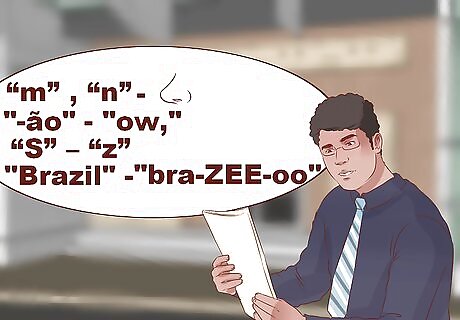
Know the rules and exceptions. Unlike Spanish, Portuguese has quite a few not-so-tried-and-true pronunciation rules. A lot of how a letter sounds depends on its placement within the word. And sometimes what you're used to and what it actually sounds like are quite different. Here are some examples: Nasalize (that is, say through your nose) every "m" and "n" at the end of every syllable (but not between vowels) so they sound like "ng." "Bem" (well) then is pronounced like "beng." The sound "-ão" sounds a lot like "ow," but that tilde on top of the "a" means it must be said entirely through your nose. "S" sounds like "z" when it is between two vowels, and like "s" otherwise. So "casa" is pronounced "caa-za", "absinto" is pronounced "abi-ssin-too", and "suave" is "ssu-aa-ve". "D" and "t" become "j" and "ch" sounds before "e" or "i." So "saudades" is pronounced sa-oo-DA-jeez. Speaking of "saudades," unstressed "e" at the end of words turns to an "ee" sound. It's tempting to want to say "sa-oo-da-jayz," but that "jayz" becomes "jeez." Unstressed "o" does something similar -- it turns to "oo." "Como" then is pronounced more like "co-moo." Sometimes, it's not pronounced at all. "Cohm" would be how it's said, depending on the dialect. "L" turns to "oo," too, when not between vowels and at the end of a syllable. "Brazil" then is pronounced "bra-ZEE-oo." That trilled "r" we all know so well in Spanish turns into an "h" sound. So using what we know, how would you pronounce "morro?" It's a very strange "MO-hoo." Yep. Really.

In general, stress the second syllable. If it's not the second syllable, you'll see an accent mark indicating where the stress goes. Don't see it? Stress the second one. "CO-moo." "Sa-oo-DA-jeez." "Bra-ZEE-oo." Picking up the pattern? "Secretária" or "automático" on the other hand, tells you that the stress is on the antepenultimate syllable.
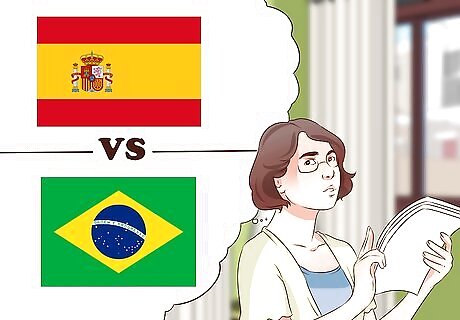
If you are familiar with Spanish, know the differences. In general, European Spanish is much different from Brazilian Portuguese than South American Spanish, which you probably could've guessed. But even though South American Spanish and Brazilian Portuguese are very similar, they have a few stark differences: Always use the "ustedes" conjugation for the second person plural and third person plural; that is, "they" and "you guys" are the same -- even with regard to formality. Whether you're giving a speech or talking to friends, it's "ustedes" all the way. The vocabulary can be quite different -- even with the most basic of words. Red in Spanish is "rojo"; in BP, it's "vermelho." Never make any assumptions; there are a ton of false cognates out there! There are only three person-conjugations. Yay! But they do use an entirely new tense, the future subjunctive. So it's a give and take when it comes to difficulty.
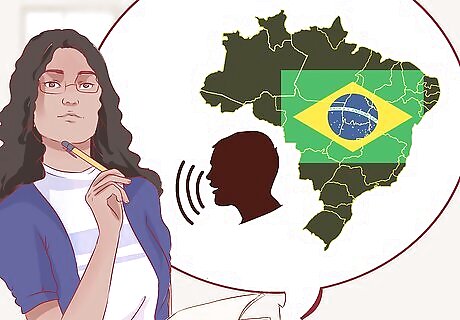
Know that the accents in Brazil can change significantly when you go to a different state. If you're traveling or moving to Rio de Janeiro, it's good to know that they've developed their own sort of accent and way of speech. Most of it lies in the expressions they use and the casual, emotive interjections they favor. But there's some pronunciation differences, too. Things like "OK" to confirm an offer are instead "Demorou!" "Bacana" means "cool," and "inteligente" becomes "cabeçudo." And that's just three examples! Cursing is frowned upon in more formal situations, obviously, but if you're blending in at the local bar watching the football game, it's gonna come up. "Porra" is a good word to start with for expressing general frustration. As for sounds, the starkest contrast is with the "r" and it should be a bit more guttural (remember how it's pronounced like an "h?") Think something closer to "loch." This goes for all "r" sounds that are at the beginning or end of a word, those that have been doubled, or those preceded by an "n" or "l." "S" at the end of words or syllables that are followed by an unvoiced consonant (t, c, f, p) gets turned to "sh" here. So "meus pais" becomes "mih-oosh pah-eesh."

Know how loan words work. Specifically, those that end in a consonant other than "r," "s," or "m." Those get pronounced as if an "e" got smushed invisibly onto the end. "Internet" is actually pronounced "eeng-teH-NE-chee." Yeah. Say that three times fast. And then there are words like hip-hop -- can you guess? -- It's like "hippee hoppee!" Loan words are actually a lot more common in Brazilian Portuguese than European Portuguese and European Spanish. For example, it's "mouse" for a computer mouse in all of South America but "ratón" across the pond. Kinda makes sense -- the majority of them are from America -- it's harder to make a jump across the Atlantic.
Language-Learning Tips
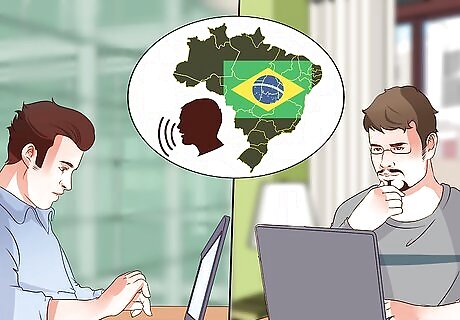
Use interactive online tools. There are a bunch of websites that can help with your speaking skills. BBC and Memrise are just two websites that offer interactive quiz features that can help you grow your database of knowledge and are way, way more than just reading words and hoping you remember them. It's fun to boot! Listen to tracks and videos online to help you with pronunciation. Since the rules are a bit all over the place, immersing yourself in them as often as possible is the best thing you can do to curve the mistakes that keep springing up.

Take a class. Being forced to speak the language for a couple of hours a week sometimes gives us the motivation we wouldn't otherwise have. Seek out a school or community center nearby that offers Portuguese classes—for conversation, business, or just general learning. Any and all exposure will do you good! The smaller the class, the better. And if it's large, try to meet someone that you can practice one-on-one with whose skills are a bit better than yours. Study groups can get you practicing every day when class isn't often enough to really build and grow.
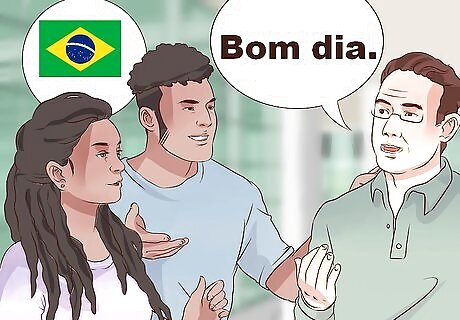
Talk to natives. It's nerve-wracking, but it's the quickest and most efficient way to get your skills honed. They know their language is difficult, so don't be worried about making mistakes. They'll just be glad you made the effort! It'll only get less stressful the more and more you do it. This is part of the reason signing up for a class is such a good idea. Your teacher or your classmates may have access to a circle that you don't and that you can become a part of. You'll be able to meet people in ways you never could've otherwise—and get something out of it, too.

Use all your skills. You may think speaking is the only way to get better at speaking, but working on your reading, writing, and listening (especially listening) can help, too. Sure, speaking is the best, but being good at the other ones won't hurt! So pick up a book, start a journal in Portuguese, and listen to documentaries, movies, and music. Do whatever you can get your hands on! YouTube is a great place to start. There are myriad tutorials online that can get your brain primed for this language, triggering your words faster and easier.



















Comments
0 comment